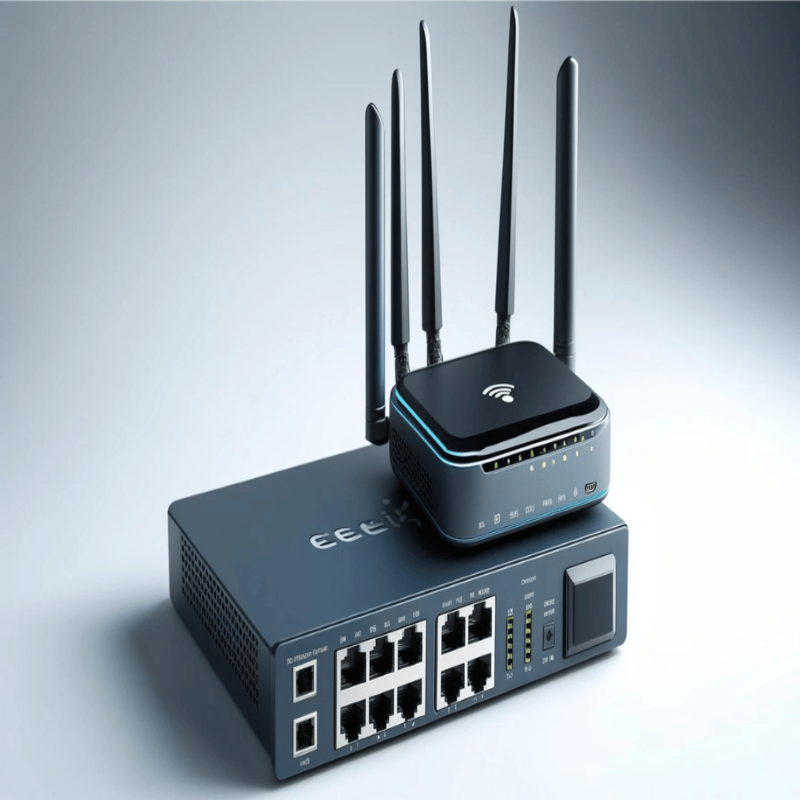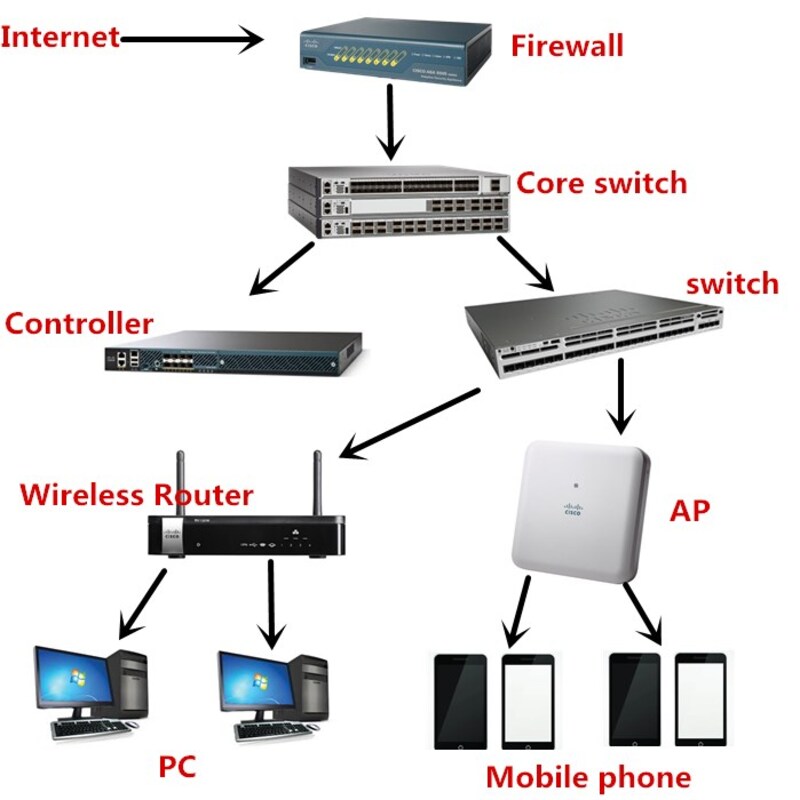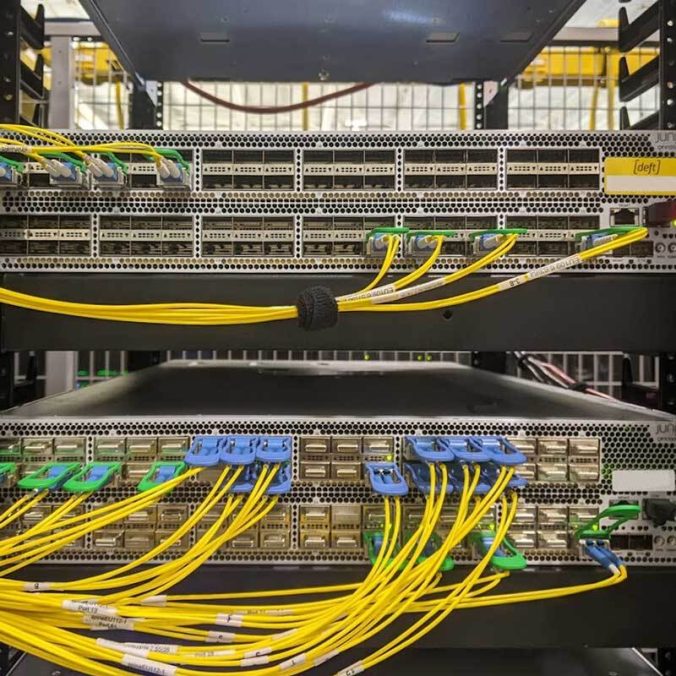In the vast world of networking, two essential devices stand out: network switch vs router. Both serve critical roles but do so in different ways. Understanding their differences can improve your network’s efficiency and performance. This guide offers a comprehensive look at these devices, detailing their functions, advantages, and use cases.
The Basics of Networking Devices
What is a Network Switch?
A network switch is a vital device in computer networks. It connects multiple devices within the same network. Its primary role is to facilitate communication between connected devices. It does this by using MAC addresses to forward data only to the intended recipient. Thus, it improves overall network efficiency.
Switches operate at Layer 2 of the OSI model, which focuses on data link layer functions. They handle traffic within a local area network (LAN). By filtering and forwarding data, switches reduce packet collisions. This characteristic significantly enhances network speed and reliability. In many homes and businesses, switches are indispensable.
Different types of switches exist, including managed and unmanaged varieties. Managed switches offer more control and features, such as VLAN support. Unmanaged switches, on the other hand, are straightforward and cost-effective. They require minimal configuration. Therefore, selecting the right switch depends on your network requirements.
What is a Network Router?
Conversely, a network router serves a different purpose. It connects multiple networks and directs data between them. Routers operate primarily at Layer 3 of the OSI model. This layer focuses on the network layer and IP addresses. Thus, routers determine the best paths for data transmission.
Routers also perform essential functions, such as traffic management and access control. They can connect your home network to the internet. Moreover, routers support various protocols and help maintain connections between different systems. This flexibility makes routers pivotal in modern networking.
Besides connecting networks, routers offer security features. Firewalls integrated into routers help protect against unauthorized access. Many routers also support Virtual Private Networks (VPNs). This capability enhances the security of sensitive data. Understanding these features is crucial for choosing the right router.

Key Differences Between Switches and Routers
Layer of Operation
One of the fundamental differences lies in the layers at which each device operates. Routers function at Layer 3, focusing on IP addresses for routing data. In contrast, switches operate at Layer 2, dealing primarily with MAC addresses for local data transmission. Therefore, switches excel at facilitating communication within a single network.
Due to this difference, each device handles data differently. Routers analyze the destination of packets and determine the best path. On the other hand, switches rapidly forward data frames to their intended devices. As a result, switches typically provide faster data transmission within local networks.
Additionally, this distinction has implications for network design. In simpler networks, you may only require switches to connect devices. However, as networks grow and connect to the internet, routers become essential. Thus, understanding these layers is crucial for effective network management.
Functionality and Roles
The functionality of switches and routers also diverges significantly. Switches are primarily focused on internal data traffic management. They direct packets between devices like computers, printers, or servers. This functionality allows for seamless communication within a local network.
In contrast, routers manage traffic between different networks. They route packets based on IP addresses and various protocols. For instance, a home router connects your local devices to the wider internet. Even more, routers can balance data load efficiently across multiple connections.
Furthermore, routers often come equipped with additional features. Many modern routers support Quality of Service (QoS) settings. This feature prioritizes critical traffic, ensuring smooth streaming or gaming experiences. Conversely, switches mainly concentrate on delivering fast, efficient local data transfer.

Advantages of Network Switches
Enhanced Network Speed
One of the significant advantages of using network switches is their ability to enhance speed. Because switches forward data directly to the intended device, they minimize delays. This efficiency is especially evident in busy networks. Thus, switches can manage high volumes of traffic seamlessly.
By reducing packet collisions, switches maintain high throughput. They are designed to handle multiple data streams simultaneously. This characteristic is essential for environments with numerous devices connected. Consequently, businesses heavily rely on switches to maintain optimal performance.
Furthermore, switches enable faster data transfer rates. With technologies like Gigabit Ethernet, switches can support speeds of up to 1 Gbps. This capability is crucial for applications requiring large data transfers. Without switches, networks would struggle to meet modern demands for speed and reliability.
Scalability and Flexibility
Another notable advantage of switches is their scalability. As your network grows, adding more devices becomes increasingly vital. Switches facilitate this expansion effortlessly. By connecting additional devices to a switch, you can quickly scale your network without major changes.
Flexibility is also key when it comes to network switches. Managed switches, in particular, allow for extensive configuration options. Network administrators can create Virtual Local Area Networks (VLANs). These VLANs segment traffic for security or performance needs.
Moreover, switches support various port configurations. This feature allows for both high-speed and low-speed devices to coexist. Such versatility is beneficial in diverse network environments. Thus, organizations can customize their setups to meet specific operational requirements.
Advantages of Network Routers
Comprehensive Network Connectivity
Routers provide comprehensive network connectivity by linking various networks. This functionality is essential for both home and business environments. A router connects local networks to the internet, enabling global communication. As a result, users can access numerous resources and services online.
Moreover, routers often support multiple WAN connections. This feature provides redundancy and a failover solution. If one connection goes down, the router can switch to another, ensuring continuous internet access. Businesses can rely on this functionality to maintain productivity.
In addition, advanced routers allow for multiple network configurations. For example, they can support both wired and wireless connections. This versatility is beneficial in homes where devices vary. Thus, routers help seamlessly incorporate various technologies into one network.
Integrated Security Features
Another substantial advantage of routers is their integrated security features. Most routers come equipped with firewalls that protect against external threats. These firewalls monitor incoming and outgoing traffic, blocking suspicious activity. As a result, routers provide an additional layer of security.
Many routers support encryption protocols as well. For instance, Wi-Fi Protected Access (WPA) secures wireless connections. Furthermore, routers that support VPN connections enhance security for remote workers. This capability allows users to access corporate networks securely from anywhere.
Moreover, routers often include parental controls and content filters. Such features allow households to manage internet access for children. Thus, routers contribute to both security and usability in everyday scenarios. This balance is crucial for maintaining a safe and efficient networking environment.

Use Cases for Network Switches
Home Networking
In home networking, switches play a vital role. Many households have multiple devices needing wired connections. For instance, desktop computers, gaming consoles, and smart TVs often perform better with Ethernet cables. Consequently, switches become essential for managing these connections effectively.
When connected to a router, switches can expand the available ports. As a result, you can connect more devices than original router ports allow. This setup is particularly useful for gamers and streamers who demand fast, reliable connections. Thus, switches can significantly improve user experiences.
Moreover, using switches in home networks enhances network reliability. Unlike wireless connections, wired connections are less prone to interference. This improvement ensures stable connections for streaming services, video calls, and online gaming. In summary, switches offer a feasible solution for modern home networking challenges.
Business Networking
In business environments, switches are indispensable for connectivity. Most offices rely on multiple devices that need to communicate effectively. Switches facilitate fast data exchanges among computers, printers, and servers. Consequently, they improve overall productivity in modern workplaces.
Moreover, managed switches offer additional features useful for organizations. They can segment traffic into VLANs, providing enhanced security. By isolating sensitive data, businesses protect their critical assets from unauthorized access. Thus, switches become a strategic investment for companies prioritizing security.
Scalability also becomes a significant factor when considering switches in businesses. As companies grow, so does their need for more connections. Switches can easily accommodate this growth without requiring extensive reconfiguration. Therefore, businesses can adapt their networking solutions effectively over time.
Use Cases for Network Routers
Home Internet Access
Routers are fundamental for home internet access. They connect household devices to the internet, allowing seamless browsing and streaming. Without routers, individual devices would need separate internet connections. This situation would be inconvenient and costly for most families.
Furthermore, modern routers support various wireless standards. For example, Wi-Fi 6 technology enhances speed and efficiency. This advancement is particularly important for families with multiple users. As a result, everyone can enjoy a stable connection whether streaming videos or gaming.
In addition, routers help manage bandwidth usage effectively. Many routers allow users to prioritize devices, ensuring fair resource distribution. This capability is beneficial for households where multiple devices compete for bandwidth. Ultimately, routers greatly improve household internet experiences.
Corporate Networking
In corporate environments, routers serve as the backbone of network connectivity. They enable businesses to link multiple local area networks (LANs) effectively. This function supports remote offices and employees in a cohesive manner. Thus, routers become vital for maintaining operational continuity.
Moreover, routers help manage complex traffic loads. Many routers support load balancing across different WAN connections. This capability ensures that internet access remains uninterrupted, even during high demand. Consequently, businesses can maintain productivity and reliability in their operations.
Finally, security is crucial in corporate networks. Advanced routers often come equipped with built-in protective measures. These features safeguard sensitive corporate data from external threats. Thus, companies can rely on routers to enhance their overall security posture while facilitating efficient communication.
Conclusion
In conclusion, network switches and routers serve unique but complementary functions in networking. While switches excel at managing local traffic, routers connect different networks and secure data flow. Understanding these differences empowers users to make informed decisions about their networking needs.
Both devices contribute significantly to the functionality and efficiency of modern networks. Whether in homes or businesses, switches and routers play vital roles. Their combined use can lead to optimal performance, improved security, and seamless connectivity.
As technology continues to advance, staying updated on networking devices is essential. Continuous development in both switches and routers offers new features and capabilities. Therefore, investing in the right devices can significantly enhance your networking experience.
